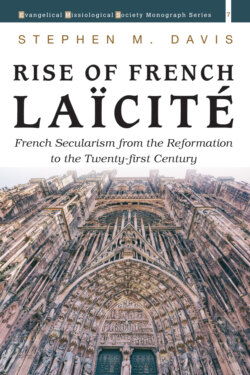Rise of French Laïcité

Описание книги
Americans are often baffled by France's general indifference to religion and laws forbidding religious symbols in public schools, full-face veils in public places, and even the interdiction of burkinis on French beaches. An understanding of laicite provides insight in beginning to understand France and its people. Laicite has been described as the complete secularization of institutions as a necessity to prevent a return to the Ancien Regime characterized by the union of church and state. To understand the concept of laicite, one must begin in the sixteenth century with the Protestant Reformation and freedom of conscience recognized by the Edict of Nantes in 1598. This has been called the period of incipient laicite in the toleration of Protestantism. The Revocation of the Edict of Nantes in 1685 reestablished the union of the throne and altar, which resulted in persecution of the Huguenots who fought for the principle of the freedom of conscience. French laicite presents a specificity in origin, definition, and evolution which led to the official separation of church and state in 1905. The question in the early twentieth century concerned the Roman Catholic Church's compatibility with democracy. That same question is being asked of Islam in the twenty-first century.
Оглавление
Stephen M. Davis. Rise of French Laïcité
Rise of French Laïcité
Table of Contents
Abbreviations
Preface
Introduction
Laïcité and the. Religious Question
Reformation and. Incipient Laïcité
Nineteenth-Century Revival. of Republicanism
Foundational Documents and Political Debates on Laïcité
Laïcité in the Twentieth Century
Twenty-First-Century Challenges to Laïcité
Conclusion and Implications. for Gospel Ministry
Bibliography
Отрывок из книги
“Davis’s masterful treatment of the historical rise of French laïque culture provides a foundational understanding for the revolutionary changes in contemporary, French self-understanding as a post-Catholic nation. It also builds a framework for understanding the new secularized consciousness with its contingent practical challenges currently emerging among youth and immigrant populations in France.”
—Daniel Sheard, Assistant Professor, John W. Rawlings School of Divinity,
.....
81. Holt, “Kingdom of France,” 23–24.
82. Lindberg, European Reformation, 290.
.....
Добавить отзыв
Отзывы и комментарии читателей
Нет рецензий.
Будьте первым, кто напишет рецензию на книгу Rise of French Laïcité
Подняться наверх
